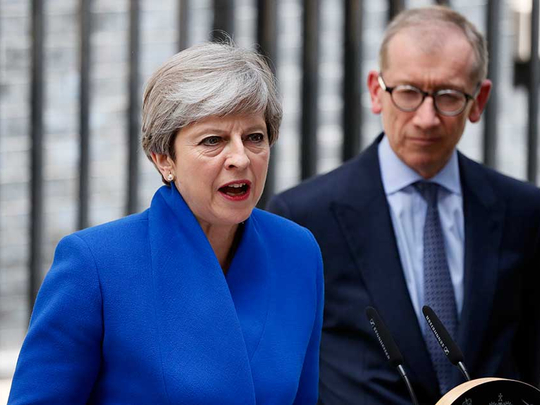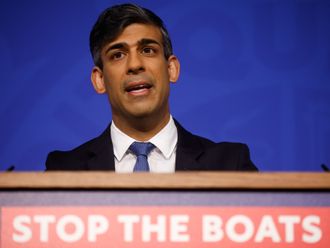
London: Britain’s general election has ended with no party winning an outright majority, bringing the second so-called hung Parliament in the last three elections.
Here are a few questions over what it means and its implications for the country.
QUESTION: WHAT IS A HUNG PARLIAMENT?
Answer: It’s an unusual situation in which no political party wins more than half of the 650 seats in the House of Commons. Without such a majority, the government cannot be assured of passing legislation and often has to rely on the support of other parties. Prime Minister Theresa May called for this general election in April - three years early - because she thought her Conservative Party would win handily. It may not have.
The Conservatives previously had a majority of 331 seats in the House of Commons. They needed to win at least 326 seats. They are projected to have won 314 seats.
Q: WHAT HAPPENS NEXT? WHO FORMS THE GOVERNMENT?
A: Prime Minister Theresa May, as the leader of the largest single party in the House of Commons, will have the first chance to put together a government and present a formal programme, known as the Queen’s Speech. She could do this either by forming a formal coalition with one or more other parties, which would give those parties seats in her Cabinet. Or she could seek to govern through a so-called “confidence and supply” arrangement with other parties, in which they agree to support the minority government on vital matters, such as the Queen’s Speech or the budget, in return for concessions.
Q: WHO WOULD BE THE PRIME MINISTER?
A: May would still be the prime minister tomorrow. But her position would become very precarious.
If she could retain the support of her own party, she would have the right to remain in office until the first meeting of the new Parliament, according to the Cabinet Manual, which lays out the rules and norms of the British government. The new Parliament is expected to meet early next week.
Q: WHAT WOULD HAPPEN THEN?
A: If she proved to have no overall majority, between now and then, May would try to shore up support from lawmakers, which would mean wooing other parties in the hope of creating a power-sharing alliance that would command at least 326 seats.
That could mean a coalition government, in which other parties get some seats in the Cabinet, or more likely it could mean a “confidence and supply” arrangement, in which smaller parties agree to support May in exchange for her support on specific policy goals they hold dear. Those parties would not get Cabinet seats, though.
May may find allies in two parties in Northern Ireland, the Democratic Unionist Party, which supported Britain’s exit from the European Union, or Brexit, and the Ulster Unionist Party, which now accepts it.
But she could face hostility from larger parties like the Liberal Democrats and the Scottish National Party, which are left-leaning and anti-Brexit. If it becomes clear that a majority of Parliament members are unlikely to support May, the Cabinet Manual states that she is expected to resign.
Q: WHICH PARTIES ARE LIKELY TO SUPPORT THE CONSERVATIVES?
A: The most likely partner for the Conservatives is the Democratic Unionist Party of Northern Ireland. Current projections give the DUP 10 seats in the House of Commons and the Conservatives 319, enough to form a working majority. While the parties are closely aligned they differ on issues such as pensions and the details of Britain’s exit from the European Union. The Conservatives could be forced to compromise to win DUP backing.
Q: WHAT HAPPENS IF THE PRIME MINISTER CAN’T FORM A GOVERNMENT?
A: If she fails to cobble together a majority, the queen could then ask the main opposition Labour Party to try to form a government. Given the election arithmetic, Labour would struggle to get the numbers to form a government. Based on current seat projections, Labour and its potential likely allies will fall short in getting a majority. However, it could govern as a minority government, too.
Q: WHAT HAPPENS IF NO PARTY IS ABLE TO FORM A GOVERNMENT?
A: New elections will be called.
Q: HOW COMMON ARE HUNG PARLIAMENTS?
A: There have been six hung Parliaments since 1900. No party won a majority in elections in 1909, 1929, 1974 and 2010.
In 2010, the Conservatives formed a coalition government with the Liberal Democrats, the first formal coalition since Winston Churchill’s government during World War II. In 1974, a minority Labour government was in charge for eight months because the Conservatives were willing to abstain on key votes. In the other four instances minority governments were able to survive as a result of agreements with other parties.












